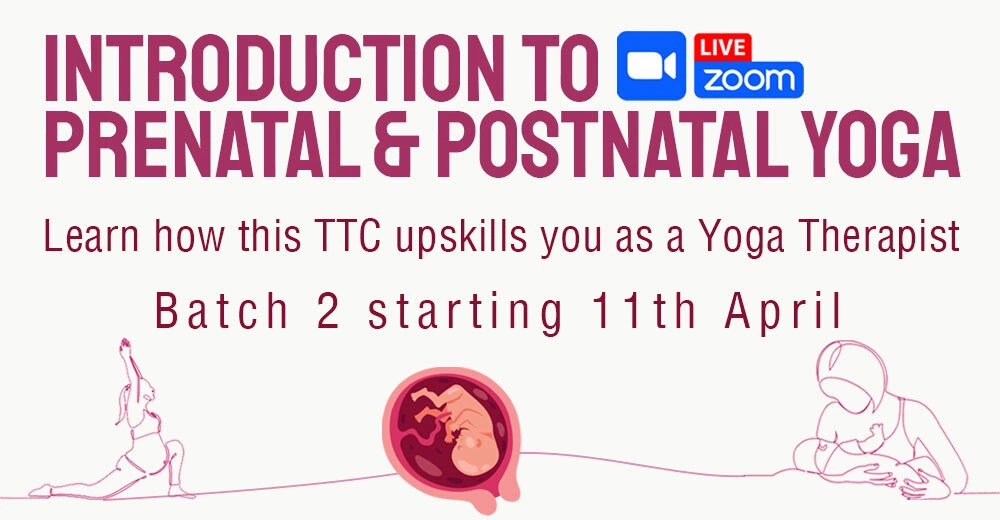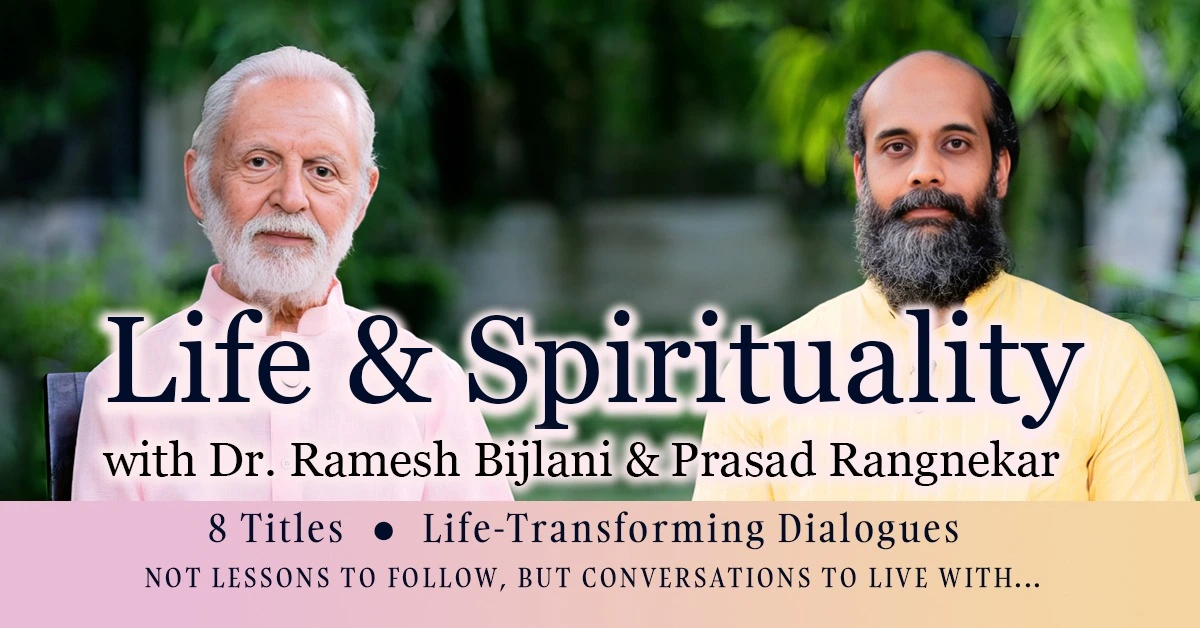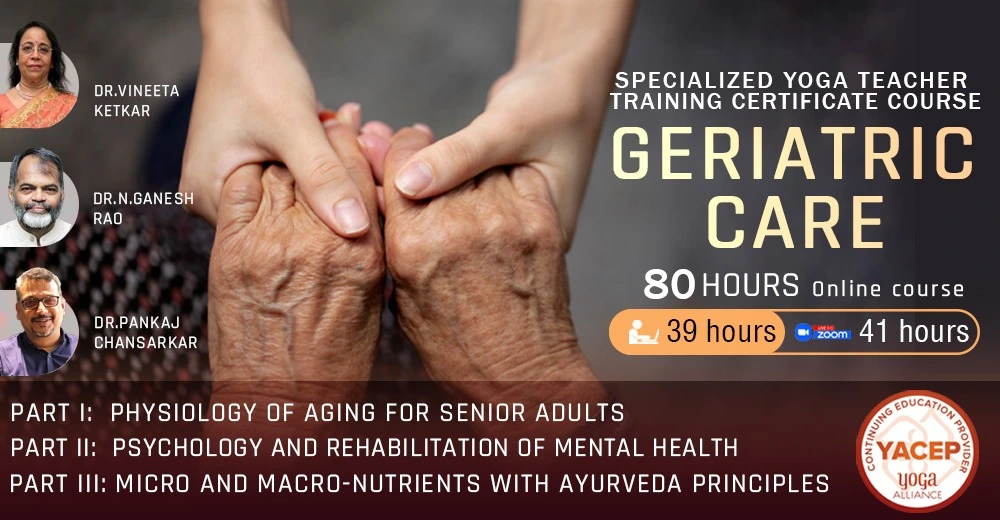Online Yoga Therapy Courses (Authentic Training Programs)
Achieve self-care and self-realization with our online yoga therapy course. Experienced yoga gurus guide you at every step so you can alleviate physical and mental health conditions and have a happier lifestyle.

Join Best Yoga Therapy Courses
hellomyyoga is your authentic source for yoga therapy training programs


About hellomyyoga
Offering Purposeful & Transformational Yoga Courses Online

Our vision at hellomyyoga is to make the power of ancient yogic sciences accessible to everyone and to help them reach their full potential by creating a supportive and inclusive space to learn, grow, and find fulfillment.
We strive to empower individuals to improve their mental, physical, environmental, and spiritual well-being, and to promote awareness and connection with the wider global community.
Our online yoga and wellness courses provide pathways to self-discovery and meaningful growth, making us proud to have earned the support and trust of 77+ countries!
As a company, we are committed to providing high-quality, accessible, and engaging online yoga courses, while offering a safe and welcoming space for people to connect, learn, and grow.
Why Choose hellomyyoga for a Yoga Therapy Course?
Globally Accessible
Yoga therapy courses offered by hellomyyoga are available to people from any country. Our online sessions make it possible for you to learn from any part of the world. Whether you are from India, the US, the UK, Australia, or anywhere in the world, you can join our programs.
Customised Programs
Our yoga therapy course is different and tailored to a person’s needs. We aim to empower participants to transform their wellness and health through customised yoga therapy sessions. It is also meant for yoga trainers who want to upskill themselves.
Life-changing Experience
If attended regularly, yoga therapy training can help you evolve and solve many life problems. It opens your mind to make active decisions to address certain issues related to the emotional, mental, and physical state.
Seek Authentic Knowledge
Our yoga gurus have gained yoga knowledge from traditional Vedic schools, and our courses are based on ancient scriptures and texts. We encourage a positive lifestyle with an enhanced mind, soul, and spirit connection.
Knowledge & Skills for Holistic Healing
Our courses on yoga therapy upskill you for holistic healing. We cover anatomy, kinesiology, physiology, pathophysiology, medical management, rope and belt therapy, spiritual anatomy, prana nadi chakra, and more aspects.
Well-Curated Programs for Yoga Enthusiasts
Our yoga therapy courses are well-curated for yoga trainers, instructors, fitness coaches, and life coaches. You learn every practice from highly experienced gurus having more than a decade of experience. It’s also an ideal program for those who have done yoga teacher training courses and want to upskill.
The data you are looking for is not available.
FAQs Related to Yoga Therapy Courses & Training
Yoga therapy is a guided process to empower people, so they have improved health and can attain overall well-being by applying different yoga practices. It aims at alleviating mental and physical health conditions and promotes self-care. It helps cultivate the mind and body and hence, has therapeutic effects.
It is a holistic approach that combines yoga postures, breathing exercises, meditation, and mindfulness techniques to promote overall well-being.
Yoga therapy can be used to treat a variety of health conditions, including anxiety, depression, chronic pain, post-traumatic stress disorder (PTSD), sleep disorders, digestive issues, and cardiovascular disease. It can also be used as a complementary therapy to support conventional medical treatments.
Yoga therapy is an easy yet effective solution to manage symptoms, improve overall health, and improve body functions.
It helps treat the following conditions:
Asthma
Scoliosis
Depression
Anxiety
Hypertension
Insomnia
Digestive issues
Arthritis
Trauma
Its overall benefits are:
Relieves stress and anxiety: Yoga therapy has been shown to reduce levels of the stress hormone cortisol, promoting relaxation and reducing anxiety. It can also help manage symptoms of depression and other mood disorders.
Improves Self Awareness: As yoga therapy helps you focus on your mind and body together, you become aware of your thoughts, emotions, and consciousness. You connect with the universe and higher self.
Inspires for a positive lifestyle: With a calm mind and inner strength, yoga therapy inspires you to adopt a positive lifestyle where you are free from anxieties, negativity, and several mental conditions.
Improves flexibility and mobility: Yoga therapy includes gentle stretching and movements that can help improve range of motion, flexibility, and balance, which can be especially beneficial for individuals with conditions such as arthritis or other chronic pain conditions.
Reduces pain: Yoga therapy can be used to help manage chronic pain, including back pain, neck pain, and joint pain. It can help improve circulation and reduce inflammation, providing relief from pain.
Enhances respiratory function: The yoga therapy course includes breathing exercises that can help improve respiratory function and reduce symptoms of respiratory conditions such as asthma and chronic obstructive pulmonary disease (COPD).
Strengthens the immune system: Yoga therapy training improves immune function, helping to protect against illness and disease.
Improves sleep quality: It promotes relaxation and reduces stress, helping to improve sleep quality and duration.
Supports overall well-being: Furthermore, a yoga therapy course helps you feel more relaxed, calm, and centred, promoting a sense of well-being and a greater connection with your body.
Aligns Mind, Body, and Spirit: With regular yoga therapy sessions led by proficient instructors, you find inner peace, feel relaxed, and stay calmer. Your mind, body, and soul become one and you are able to focus more o0n the moment.
Yes, yoga therapy is a good option for almost every individual, even if you are struggling with a mental health condition. It helps you get rid of stress, improve the quality of sleep, and increase energy.
The yoga therapy course by hellomyyoga is based on a holistic approach to healing and health. Our yoga therapy programs focus on a positive lifestyle, mind, body, and soul connection, consciousness, introspective spirituality, balanced life, and connection and your higher self.
Yoga therapy adopts an individual approach, where sessions are customised based on your goals.
We offer the best yoga therapy course in India to help you attain the following objectives:
Improve regular functions of the body
Remove, manage, or reduce symptoms of an ailment
Promote a healthy mind, body, and spirit
Encourage mindfulness
Prevent recurrence of causes or symptoms of illness
Our yoga therapy courses enable yoga instructors to enhance their knowledge and upskill themselves. We help them understand various aspects of yoga and gain an understanding of the following:
Anatomy: They learn how each yoga pose affects the body and helps in the healing process. Based on the physical framework of muscles, joints, and fascia, they understand the uniqueness of every human body and what works best for each.
Kinesiology: Our yoga therapy sessions also help them study human function, movements, and performance. Our courses are based on a scientific and evidence-based approach so you can learn about human movements efficiently.
Physiology: You will gain knowledge of how a body is described and understood in yogic philosophy and teachings. Moreover, we’ll train you to apply modern science and anatomy to analyse the effects of yoga on the human body.
Pathophysiology: As an aspiring yoga therapist, you will learn to identify changes in the human body and its functions due to disease and various symptoms.
Medical Management: Learn to incorporate breathing techniques, mindfulness, and meditation to ensure overall wellness. You will get familiar with a holistic approach of treating an ailment and medical condition.
Rope & Belt Therapy: We will also teach you key principles of rope and belt therapy, which include stretching of selective skeletal muscles, postural awareness, restoration of bone alignment, and correction of pelvic and shoulder girdles.
Spiritual Anatomy: Spiritual anatomy is an integral aspect of yoga therapy that explores the relationship between the body, mind, and spirit. It is the study of the subtle energy channels or nadis, chakras, and prana, which are believed to exist within the body.
Yoga therapy aligns an individual’s unique and precise health needs with yoga practices approved by medical science and yoga tradition to have curative effects.
For example, if one is struggling with back pain, a yoga therapist will suggest certain postures to strengthen and support the back while soothing the symptoms of a herniated disc.
The online yoga therapy sessions are designed to create a mind-body balance through meditation, breathing, and posture techniques. The three together trigger a relaxation response and help in the healing process.
Many may be confused between yoga and yoga therapy and use the two concepts interchangeably. However, there is a significant difference between them.
Yoga focuses on harmonising the body using breathing techniques and physical poses and leads to self-discovery. On the other hand, yoga therapy involves yoga that aims at progressing toward improved overall well-being.
The two are different in class setup. A yoga class usually includes multiple students performing the same poses following the gentle instructions of a yoga teacher. However, yoga therapy focuses on an individual, and a yoga therapist guides each person with custom movements based on their goals and health concerns.
The approaches of the two are also poles apart. Yoga follows a series of poses, including pranayama and meditation, leading to several physical and mental benefits. Yoga therapy has an individual approach, and the sessions are designed based on the person’s medical condition, illness, age, strength, etc.
Yoga therapy is becoming an increasingly important aspect of modern healthcare due to its potential to improve physical, mental, and emotional well-being in a holistic way. With new insights and updates in medical treatments, yoga therapy is continuously adapting, keeping pace with modern healthcare and rising demands. However, an effective yoga therapy session needs a highly-skilled and knowledgeable instructor who is well-versed in implementing variations, contraindications, and modifications while working with clients.
Here are some specific reasons why yoga therapy is important in healthcare today:
Complementary and Alternative Medicine: As more and more people are seeking alternative and complementary approaches to healthcare, yoga therapy is emerging as a viable option for those seeking a non-invasive, non-pharmacological approach to managing their health conditions. Hence, the role of authentic yoga therapy courses is crucial.
Integrative Care: Yoga therapy can be used as a complementary therapy alongside conventional medicine to address a wide range of health conditions, including chronic pain, anxiety, depression, and cardiovascular disease. Integrating yoga therapy into conventional medical treatments can help improve the overall effectiveness of healthcare and provide patients with a more comprehensive and holistic approach to healing.
Evidence-Based: There is a growing body of scientific research supporting the effectiveness of yoga therapy in improving various health conditions. As more research is conducted, the potential for yoga therapy to be incorporated into conventional healthcare practices increases.
Focus on Prevention: Yoga therapy can be used as a tool for preventing illness and diseases by promoting healthy lifestyle choices, reducing stress and anxiety, and improving overall physical and mental well-being. By taking a proactive approach to health, individuals can reduce the risk of developing chronic diseases and improve their quality of life.
Backed by Research: Yoga therapy includes certain elements of yoga practices, adapted to meet several psychological, physical, and emotional needs of clients. It is supported by modern research, medicine, and psychology.
Mind and Body Connection: The origin of yoga therapy lies in the need for increased support for mental and physical health. It deeply studies human conditions and creates a safe space where one can find peace, introspection, and their higher self while connecting with others.
Yoga therapy has been shown to have numerous physical health benefits, making it a valuable tool for promoting overall health and well-being. Here are some of the main physical benefits of yoga therapy training:
Pain Relief: Yoga therapy has been shown to help relieve chronic pain, particularly in the lower back, neck, and shoulders. This may be due to the combination of stretching and strengthening exercises, as well as the relaxation and stress-reducing benefits of yoga.
Better Breathing: Yoga therapy includes various breathing exercises (pranayama) that can help improve lung function and increase oxygen uptake. This can be particularly beneficial for individuals with respiratory conditions, such as asthma or COPD.
Improved Blood circulation: It supports the production of blood which happens in the bone marrow of thighs. As you stretch blood verssels and muscles, yoga therapy also keeps the blood vessels elastic.
Lowered Blood Pressure: Yoga therapy has been shown to help reduce blood pressure in individuals with hypertension, potentially reducing the risk of heart disease and stroke.
Improved Digestion: Certain yoga postures and breathing exercises can help stimulate digestion and improve gastrointestinal function, reducing symptoms of digestive disorders such as constipation, bloating, and acid reflux.
Below are some of the main benefits of yoga therapy course in terms of mental and emotional health:
Reduced Stress and Anxiety: Yoga therapy includes various relaxation and breathing techniques that can help reduce stress and anxiety. These practices have been shown to lower cortisol levels, a hormone associated with stress, and promote feelings of calm and relaxation.
Integrated mind-body focus: Yoga therapy allows you to focus on your mind and body simultaneously, developing mental and physcial awareness. This ensures mind-body integration and cultivates mindfulness.
Improved Mood: Practicing yoga can help improve mood and reduce symptoms of depression. This may be due to the release of endorphins, the body's natural "feel-good" chemicals, during physical activity.
Introspective Spirituality: Yoga therapy allows you to be aware of your conscious thoughts and feelings. You connect with your higher self, which brings positivity and balance in your life.
Increased Self-Awareness and Mindfulness: Yoga therapy emphasizes the mind-body connection, helping individuals become more aware of their thoughts, emotions, and physical sensations. This increased self-awareness can help individuals better manage their emotions and cope with stress.
Better Sleep: Yoga therapy has been shown to improve sleep quality and reduce insomnia. This may be due to the relaxation and stress-reducing benefits of yoga, as well as the physical activity involved in practising yoga.
Increased Resilience: Yoga therapy combines physical activity, relaxation, and mindfulness practices, which builds resilience or the ability to bounce back from adversity.
Improved Cognitive Function: Yoga therapy has been shown to improve cognitive function and memory, potentially reducing the risk of age-related cognitive decline.
Increased Emotional Regulation: Practicing yoga can help individuals better regulate their emotions and respond to stressful situations in a more adaptive way. This can be particularly beneficial for individuals with conditions such as anxiety or post-traumatic stress disorder (PTSD).
Anyone facing mental or physical health conditions will find yoga therapy helpful. Our yoga therapy programs aim at helping you find balance in life, inner peace, mind, body & soul connection, and positivity.
Yoga therapy is helpful in treating several mental and physical health conditions. It is an effective treatment for stress, anxiety & panic disorder, insomnia, eating disorder, phobias, PTSD, schizophrenia, and addiction.
Anyone struggling with chronic pain, diabetes, high blood pressure, Alzheimer’s, autoimmune diseases, arthritis, asthma, and neurological issues can also join yoga therapy to seek guided assistance from experienced gurus.
Yoga therapy is generally considered safe for most individuals, but it's important to work with a qualified and experienced yoga therapist to ensure that the practices are appropriate for your individual needs and health conditions. Hence, you must go for an online yoga therapy course by hellomyyoga where you get training from yoga teachers with more than a decade of experience in this field.
No, previous yoga experience is not necessary to try yoga therapy. Yoga therapy is designed to meet the specific needs of each individual, regardless of their previous experience with yoga.
However, if you are planning to join our yoga therapy training, you must be an experienced yoga instructor. This course will help you acquire updated knowledge and advanced skills to use yoga to treat several mental and physical health conditions.
Special Initiatives
Digital and real-world noise have caused us to become restless creatures of indecision. Our mind attaches to the ego, which causes us to misunderstand reality.
hellomyyoga has created special initiatives for people looking to live healthier lives. Our yoga courses and programs provide holistic knowledge to adopt a healthy lifestyle for better mental health and happy ageing.
hellomyyoga Categories
Yoga Programs
Explore expertly designed online yoga programs for all levels, including beginners, advanced practitioners, yoga teachers, and enthusiasts. Join now!
Bhagavad Gita Courses
Get into the heart of yogic philosophy with the online Bhagavad Gita courses by hellomyyoga.
Free Yoga Courses
Join our free yoga courses and programs 2023 and experience the physical, mental, and spiritual benefits of yoga from the comfort of your home. Join now!
Health Wellness Courses
Discover the best online health and wellness courses to transform your well-being. These courses offer expert guidance and practical knowledge. Join now!
Prenatal Yoga Courses
Discover the best prenatal yoga courses online for pregnant women. Stay fit and calm throughout your pregnancy with our prenatal yoga programs. Join now!
Yoga for Women
Discover the transformative power of yoga for women's health with our best online yoga courses & programs. Join now!
Ayurveda Courses
Discover the ancient wisdom of Ayurveda with our Ayurveda courses and programs. Learn from experienced practitioners and gain practical knowledge.
Online Meditation Courses
Discover inner peace and cultivate mindfulness with our guided online meditation courses. Join now and experience the benefits for yourself.
Yoga Therapy Courses
Our online yoga therapy courses are designed to help you manage pain and improve your overall well-being. Learn from expert teachers and transform your health.
Mental Health Courses
Take charge of your mental health with our top-rated online mental health courses and programs. Get started today and start feeling better tomorrow.
Yoga for Senior Citizens
Do you want to be active and fit in old age? Then join our specialised courses and programs of yoga for senior citizens, Get started now!
Emotional Intelligence Courses
Join our online emotional intelligence courses and programs and Learn how to regulate your emotions, enhance communication skills, resolve conflict and more.










